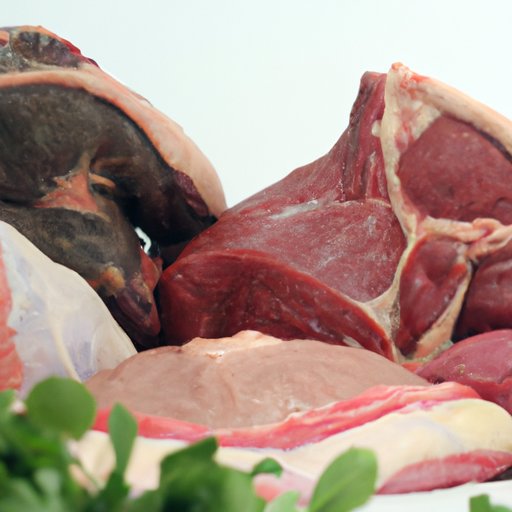Introduction
The question of whether humans are “supposed” to eat meat has been debated for centuries. While some argue that humans have evolved to consume animal products, others point out that plant-based diets can provide all of the nutrients needed for optimal health. In this article, we will explore the pros and cons of eating meat, as well as its environmental, ethical, and cultural implications.

Pros and Cons of Eating Meat
One of the main arguments in favor of consuming meat is that it provides several essential nutrients. According to a study published in Nutrients, “Animal sources of protein, such as meat, contain higher amounts of essential amino acids (EAAs) than plant sources.” These EAAs are important for muscle growth and repair, as well as overall health. Additionally, meat contains vitamin B12, which is not found in plant foods and is essential for healthy red blood cells and neurological function.
However, there are potential health risks associated with eating too much meat. Studies have linked high levels of red and processed meat consumption to an increased risk of certain types of cancer, heart disease, and other chronic illnesses. The World Health Organization (WHO) has classified processed meats, such as bacon, sausage, and ham, as Group 1 carcinogens, meaning they are known to cause cancer in humans.
Exploring the Health Benefits of a Plant-Based Diet
Proponents of plant-based diets argue that these diets can provide all of the essential nutrients needed for optimal health. A systematic review published in Nutrients concluded that vegetarian diets are “associated with a lower risk of mortality compared to non-vegetarian diets.” Plant-based foods are also rich in fiber, antioxidants, and phytochemicals, which can help protect against chronic diseases.
A balanced plant-based diet can provide the same macronutrients as an omnivorous diet. For example, legumes, nuts, and seeds are high in protein, while whole grains, fruits, and vegetables provide complex carbohydrates. Many plant foods are also good sources of healthy fats, such as olive oil, avocados, and nuts.
Is Meat Really Necessary for Optimal Human Health?
The debate over whether or not humans need to eat meat for optimal health is ongoing. Some argue that humans have evolved to consume animal products and that these foods provide essential nutrients that cannot be obtained from plant sources. Others point out that a well-planned plant-based diet can provide all of the necessary vitamins, minerals, and other nutrients for optimal health.
Dr. Walter Willett, professor of epidemiology and nutrition at Harvard School of Public Health, said: “If properly planned, vegetarian diets can meet all the recommendations for nutrients… There is no reason to think that any nutrients are lacking in vegetarian diets.” He goes on to say that plant-based diets may even provide additional health benefits, such as a lower risk of cardiovascular disease and type 2 diabetes.
The Environmental Impact of Meat Consumption
In addition to potential health risks, the production of meat has a significant environmental impact. According to a report by the United Nations Food and Agriculture Organization, livestock production accounts for 14.5% of global greenhouse gas emissions. Livestock production also uses large amounts of water and land, which can lead to soil erosion and deforestation.
The environmental impact of meat consumption is compounded by the amount of food waste associated with it. A study published in Environmental Science and Technology estimated that up to 30% of edible protein from animal sources is lost due to food waste. This figure is significantly higher than the 5-10% of edible plant proteins that are lost to food waste.

Ethical Considerations of Eating Meat
The ethics of eating animals has also been widely debated. Animal rights activists argue that animals should not be used for human consumption, as they are sentient beings who feel pain and fear. Supporters of local farmers and small-scale meat production point out that these operations often treat their animals more humanely than large-scale factory farms.
Dr. Steven Wise, president of the Nonhuman Rights Project, said: “We have to recognize that animals, like us, are autonomous moral actors who have an interest in not being enslaved and killed for our purposes.” He goes on to say that “we must respect the autonomy of other species, particularly those that are capable of feeling pain and suffering.”
Examining Historical Attitudes Towards Meat Consumption
Attitudes towards meat consumption have changed over time. In ancient societies, meat was considered a luxury item and was only eaten by wealthy individuals. During the Middle Ages, meat became more widely available, but it was still mainly consumed by the upper classes. Today, meat is widely available and consumed by people of all socioeconomic backgrounds.

Understanding the Cultural Significance of Meat in Different Countries
Different cultures have different attitudes towards meat consumption. In the United States, meat is a staple of the diet and is seen as a sign of prosperity and abundance. In India, however, many Hindus follow a vegetarian or vegan diet due to religious beliefs. In some parts of the world, meat is seen as a delicacy and is only eaten on special occasions.
Conclusion
The debate over whether humans are “supposed” to eat meat is complex and multifaceted. While some argue that humans have evolved to consume animal products, others point out that plant-based diets can provide all of the essential nutrients needed for optimal health. Additionally, there are potential health risks associated with eating too much meat, as well as environmental, ethical, and cultural implications to consider when making dietary decisions.
Ultimately, the decision of whether or not to eat meat is a personal one. It is important to weigh the potential health benefits and risks, as well as the environmental, ethical, and cultural implications, before making a decision.
(Note: Is this article not meeting your expectations? Do you have knowledge or insights to share? Unlock new opportunities and expand your reach by joining our authors team. Click Registration to join us and share your expertise with our readers.)
